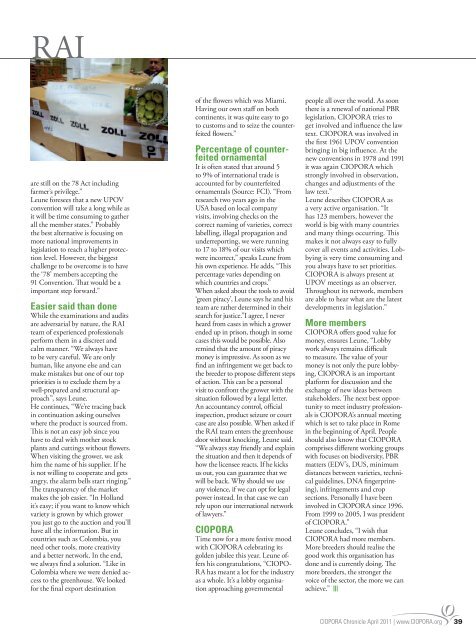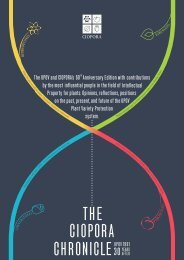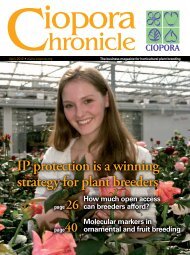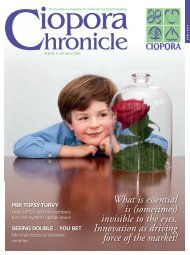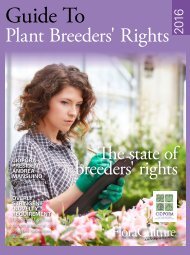2011 CIOPORA Chronicle - the 50th Anniversary Edition
CIOPORA annual magazine on Intellectual Property protection for plant innovations 2011. The magazine was produced in cooperation with FloraCulture International. Read in the 2011 CIOPORA Chronicle edition: - CIOPORA plays vital role in supporting the industry - PVR litigation on the rise - Plant Breeders´Right. Quo vadis? - China deploys national strategy for IPR - CIOPORA helps IP owners protect their rose varieties and much more...
CIOPORA annual magazine on Intellectual Property protection for plant innovations 2011. The magazine was produced in cooperation with FloraCulture International.
Read in the 2011 CIOPORA Chronicle edition:
- CIOPORA plays vital role in supporting the industry
- PVR litigation on the rise
- Plant Breeders´Right. Quo vadis?
- China deploys national strategy for IPR
- CIOPORA helps IP owners protect their rose varieties
and much more...
You also want an ePaper? Increase the reach of your titles
YUMPU automatically turns print PDFs into web optimized ePapers that Google loves.
RAI<br />
are still on <strong>the</strong> 78 Act including<br />
farmer’s privilege.”<br />
Leune foresees that a new UPOV<br />
convention will take a long while as<br />
it will be time consuming to ga<strong>the</strong>r<br />
all <strong>the</strong> member states.” Probably<br />
<strong>the</strong> best alternative is focusing on<br />
more national improvements in<br />
legislation to reach a higher protection<br />
level. However, <strong>the</strong> biggest<br />
challenge to be overcome is to have<br />
<strong>the</strong> ‘78’ members accepting <strong>the</strong><br />
91 Convention. That would be a<br />
important step forward.”<br />
Easier said than done<br />
While <strong>the</strong> examinations and audits<br />
are adversarial by nature, <strong>the</strong> RAI<br />
team of experienced professionals<br />
perform <strong>the</strong>m in a discreet and<br />
calm manner. “We always have<br />
to be very careful. We are only<br />
human, like anyone else and can<br />
make mistakes but one of our top<br />
priorities is to exclude <strong>the</strong>m by a<br />
well-prepared and structural approach”,<br />
says Leune.<br />
He continues, “We’re tracing back<br />
in continuation asking ourselves<br />
where <strong>the</strong> product is sourced from.<br />
This is not an easy job since you<br />
have to deal with mo<strong>the</strong>r stock<br />
plants and cuttings without flowers.<br />
When visiting <strong>the</strong> grower, we ask<br />
him <strong>the</strong> name of his supplier. If he<br />
is not willing to cooperate and gets<br />
angry, <strong>the</strong> alarm bells start ringing.”<br />
The transparency of <strong>the</strong> market<br />
makes <strong>the</strong> job easier. “In Holland<br />
it’s easy; if you want to know which<br />
variety is grown by which grower<br />
you just go to <strong>the</strong> auction and you’ll<br />
have all <strong>the</strong> information. But in<br />
countries such as Colombia, you<br />
need o<strong>the</strong>r tools, more creativity<br />
and a better network. In <strong>the</strong> end,<br />
we always find a solution. “Like in<br />
Colombia where we were denied access<br />
to <strong>the</strong> greenhouse. We looked<br />
for <strong>the</strong> final export destination<br />
of <strong>the</strong> flowers which was Miami.<br />
Having our own staff on both<br />
continents, it was quite easy to go<br />
to customs and to seize <strong>the</strong> counterfeited<br />
flowers.”<br />
Percentage of counterfeited<br />
ornamental<br />
It is often stated that around 5<br />
to 9% of international trade is<br />
accounted for by counterfeited<br />
ornamentals (Source: FCI). “From<br />
research two years ago in <strong>the</strong><br />
USA based on local company<br />
visits, involving checks on <strong>the</strong><br />
correct naming of varieties, correct<br />
labelling, illegal propagation and<br />
underreporting, we were running<br />
to 17 to 18% of our visits which<br />
were incorrect,” speaks Leune from<br />
his own experience. He adds, “This<br />
percentage varies depending on<br />
which countries and crops.”<br />
When asked about <strong>the</strong> tools to avoid<br />
‘green piracy’, Leune says he and his<br />
team are ra<strong>the</strong>r determined in <strong>the</strong>ir<br />
search for justice.”I agree, I never<br />
heard from cases in which a grower<br />
ended up in prison, though in some<br />
cases this would be possible. Also<br />
remind that <strong>the</strong> amount of piracy<br />
money is impressive. As soon as we<br />
find an infringement we get back to<br />
<strong>the</strong> breeder to propose different steps<br />
of action. This can be a personal<br />
visit to confront <strong>the</strong> grower with <strong>the</strong><br />
situation followed by a legal letter.<br />
An accountancy control, official<br />
inspection, product seizure or court<br />
case are also possible. When asked if<br />
<strong>the</strong> RAI team enters <strong>the</strong> greenhouse<br />
door without knocking, Leune said.<br />
“We always stay friendly and explain<br />
<strong>the</strong> situation and <strong>the</strong>n it depends of<br />
how <strong>the</strong> licensee reacts. If he kicks<br />
us out, you can guarantee that we<br />
will be back. Why should we use<br />
any violence, if we can opt for legal<br />
power instead. In that case we can<br />
rely upon our international network<br />
of lawyers.”<br />
<strong>CIOPORA</strong><br />
Time now for a more festive mood<br />
with <strong>CIOPORA</strong> celebrating its<br />
golden jubilee this year. Leune offers<br />
his congratulations, “CIOPO-<br />
RA has meant a lot for <strong>the</strong> industry<br />
as a whole. It’s a lobby organisation<br />
approaching governmental<br />
people all over <strong>the</strong> world. As soon<br />
<strong>the</strong>re is a renewal of national PBR<br />
legislation, <strong>CIOPORA</strong> tries to<br />
get involved and influence <strong>the</strong> law<br />
text. <strong>CIOPORA</strong> was involved in<br />
<strong>the</strong> first 1961 UPOV convention<br />
bringing in big influence. At <strong>the</strong><br />
new conventions in 1978 and 1991<br />
it was again <strong>CIOPORA</strong> which<br />
strongly involved in observation,<br />
changes and adjustments of <strong>the</strong><br />
law text.”<br />
Leune describes <strong>CIOPORA</strong> as<br />
a very active organisation. “It<br />
has 123 members, however <strong>the</strong><br />
world is big with many countries<br />
and many things occurring. This<br />
makes it not always easy to fully<br />
cover all events and activities. Lobbying<br />
is very time consuming and<br />
you always have to set priorities.<br />
<strong>CIOPORA</strong> is always present at<br />
UPOV meetings as an observer.<br />
Throughout its network, members<br />
are able to hear what are <strong>the</strong> latest<br />
developments in legislation.”<br />
More members<br />
<strong>CIOPORA</strong> offers good value for<br />
money, ensures Leune, “Lobby<br />
work always remains difficult<br />
to measure. The value of your<br />
money is not only <strong>the</strong> pure lobbying,<br />
<strong>CIOPORA</strong> is an important<br />
platform for discussion and <strong>the</strong><br />
exchange of new ideas between<br />
stakeholders. The next best opportunity<br />
to meet industry professionals<br />
is <strong>CIOPORA</strong>’s annual meeting<br />
which is set to take place in Rome<br />
in <strong>the</strong> beginning of April. People<br />
should also know that <strong>CIOPORA</strong><br />
comprises different working groups<br />
with focuses on biodiversity, PBR<br />
matters (EDV’s, DUS, minimum<br />
distances between varieties, technical<br />
guidelines, DNA fingerprinting),<br />
infringements and crop<br />
sections. Personally I have been<br />
involved in <strong>CIOPORA</strong> since 1996.<br />
From 1999 to 2005, I was president<br />
of <strong>CIOPORA</strong>.”<br />
Leune concludes, “I wish that<br />
<strong>CIOPORA</strong> had more members.<br />
More breeders should realise <strong>the</strong><br />
good work this organisation has<br />
done and is currently doing. The<br />
more breeders, <strong>the</strong> stronger <strong>the</strong><br />
voice of <strong>the</strong> sector, <strong>the</strong> more we can<br />
achieve.” |||<br />
<strong>CIOPORA</strong> <strong>Chronicle</strong> April <strong>2011</strong> | www.<strong>CIOPORA</strong>.org 39


